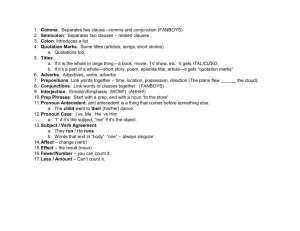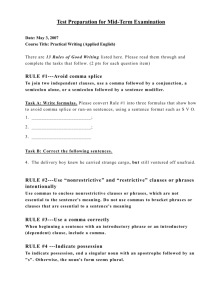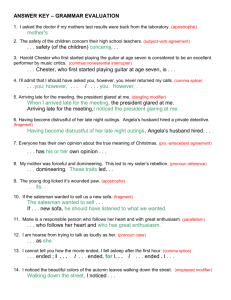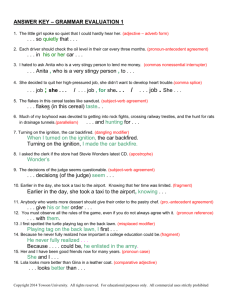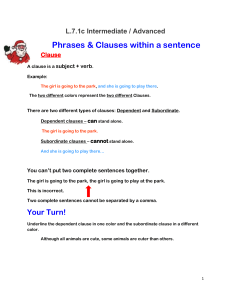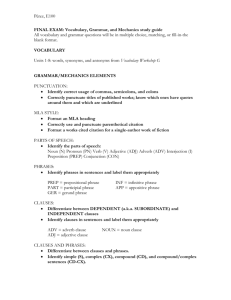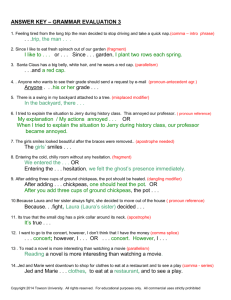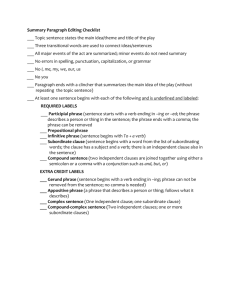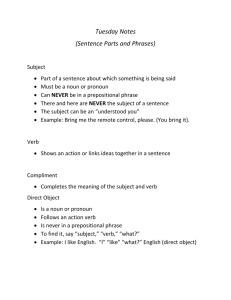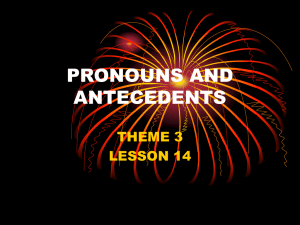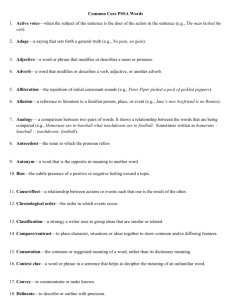Sentence Problems - Issaquah Connect
advertisement
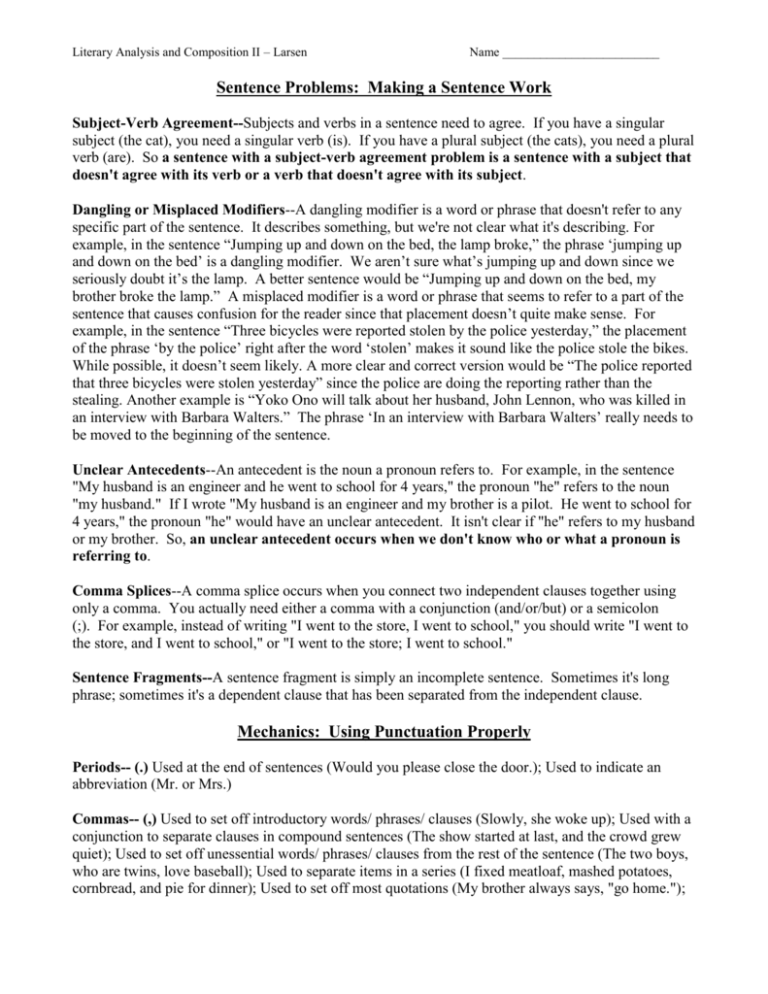
Literary Analysis and Composition II – Larsen
Name _________________________
Sentence Problems: Making a Sentence Work
Subject-Verb Agreement--Subjects and verbs in a sentence need to agree. If you have a singular
subject (the cat), you need a singular verb (is). If you have a plural subject (the cats), you need a plural
verb (are). So a sentence with a subject-verb agreement problem is a sentence with a subject that
doesn't agree with its verb or a verb that doesn't agree with its subject.
Dangling or Misplaced Modifiers--A dangling modifier is a word or phrase that doesn't refer to any
specific part of the sentence. It describes something, but we're not clear what it's describing. For
example, in the sentence “Jumping up and down on the bed, the lamp broke,” the phrase ‘jumping up
and down on the bed’ is a dangling modifier. We aren’t sure what’s jumping up and down since we
seriously doubt it’s the lamp. A better sentence would be “Jumping up and down on the bed, my
brother broke the lamp.” A misplaced modifier is a word or phrase that seems to refer to a part of the
sentence that causes confusion for the reader since that placement doesn’t quite make sense. For
example, in the sentence “Three bicycles were reported stolen by the police yesterday,” the placement
of the phrase ‘by the police’ right after the word ‘stolen’ makes it sound like the police stole the bikes.
While possible, it doesn’t seem likely. A more clear and correct version would be “The police reported
that three bicycles were stolen yesterday” since the police are doing the reporting rather than the
stealing. Another example is “Yoko Ono will talk about her husband, John Lennon, who was killed in
an interview with Barbara Walters.” The phrase ‘In an interview with Barbara Walters’ really needs to
be moved to the beginning of the sentence.
Unclear Antecedents--An antecedent is the noun a pronoun refers to. For example, in the sentence
"My husband is an engineer and he went to school for 4 years," the pronoun "he" refers to the noun
"my husband." If I wrote "My husband is an engineer and my brother is a pilot. He went to school for
4 years," the pronoun "he" would have an unclear antecedent. It isn't clear if "he" refers to my husband
or my brother. So, an unclear antecedent occurs when we don't know who or what a pronoun is
referring to.
Comma Splices--A comma splice occurs when you connect two independent clauses together using
only a comma. You actually need either a comma with a conjunction (and/or/but) or a semicolon
(;). For example, instead of writing "I went to the store, I went to school," you should write "I went to
the store, and I went to school," or "I went to the store; I went to school."
Sentence Fragments--A sentence fragment is simply an incomplete sentence. Sometimes it's long
phrase; sometimes it's a dependent clause that has been separated from the independent clause.
Mechanics: Using Punctuation Properly
Periods-- (.) Used at the end of sentences (Would you please close the door.); Used to indicate an
abbreviation (Mr. or Mrs.)
Commas-- (,) Used to set off introductory words/ phrases/ clauses (Slowly, she woke up); Used with a
conjunction to separate clauses in compound sentences (The show started at last, and the crowd grew
quiet); Used to set off unessential words/ phrases/ clauses from the rest of the sentence (The two boys,
who are twins, love baseball); Used to separate items in a series (I fixed meatloaf, mashed potatoes,
cornbread, and pie for dinner); Used to set off most quotations (My brother always says, "go home.");
Literary Analysis and Composition II – Larsen
Name _________________________
used to separate multiple adjectives describing a single noun (I wore my new, shiny, purple dress
home.)
Semicolons-- (;) Used to link independent clauses in a compound sentence (The show started at last;
the crowd grew quiet); Used to separate items in a list with other punctuation (The science department
teaches many classes including biology, the study of life forms; chemistry, the study of chemical
compounds; and physics, the study of movement and forces).
Colons-- (:) Used to introduce a list or series (I went shopping for the essentials: milk, bread, peanut
butter, and ice cream); Used to introduce a quotation (We asked ourselves the same question: "Are we
crazy?"); Used to introduce an explanation or example (Students often eat lunch at the DECA Store: a
store that sells cookies, muffins, and other cheap food and is run by the school's business program).
Apostrophes-- (') Apostrophes make nouns possessive (Brian's boat or the baby's toy) or show that
letters are left out in contractions (isn't or don't). They are not used to show possession with possessive
pronouns (his, hers, theirs).
Quotation Marks-- (" ") Used to show direct quotations--words that come from someone or
somewhere that is not you (She smiled and said "Hello, Jack."); Also used around the titles of short
pieces of writing like short stories, poems, essays, or articles (I like the poem "Death Be Not Proud" by
John Donne).
Elipses—(…) Used to show that some words have been left out of a quotation; used to show that
something unwritten came earlier (if placed at the beginning of a sentence); used to show a long, slow
break or slow-down in thought or conversation.
Capitalization--We capitalize the first word in a sentence, most proper nouns, the pronoun "I", the
titles of books/movies/magazines/etc, and the first word in a sentence that is a direct quote.
Italics—(the) Used the indicate the proper name of books, magazines, newspapers, movies, plays, and
other large works; use to indicate words in a foreign language; use to indicate that you’re talking about
a word itself, not the meaning of the word (Pneumonia is a tough word to spell). Note: When writing
by hand, underlining can take the place of italics. Use italics when typing.
